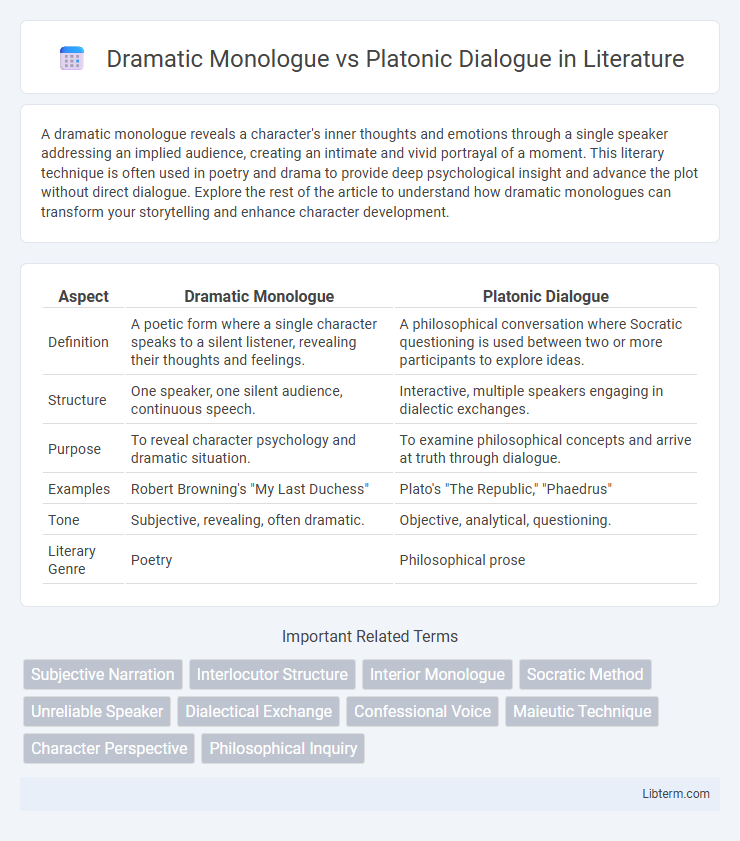A dramatic monologue reveals a character's inner thoughts and emotions through a single speaker addressing an implied audience, creating an intimate and vivid portrayal of a moment. This literary technique is often used in poetry and drama to provide deep psychological insight and advance the plot without direct dialogue. Explore the rest of the article to understand how dramatic monologues can transform your storytelling and enhance character development.
Table of Comparison
| Aspect | Dramatic Monologue | Platonic Dialogue |
|---|---|---|
| Definition | A poetic form where a single character speaks to a silent listener, revealing their thoughts and feelings. | A philosophical conversation where Socratic questioning is used between two or more participants to explore ideas. |
| Structure | One speaker, one silent audience, continuous speech. | Interactive, multiple speakers engaging in dialectic exchanges. |
| Purpose | To reveal character psychology and dramatic situation. | To examine philosophical concepts and arrive at truth through dialogue. |
| Examples | Robert Browning's "My Last Duchess" | Plato's "The Republic," "Phaedrus" |
| Tone | Subjective, revealing, often dramatic. | Objective, analytical, questioning. |
| Literary Genre | Poetry | Philosophical prose |
Understanding Dramatic Monologue
Dramatic monologue reveals a character's inner thoughts and emotions through a single speaker addressing an implied listener, offering deep psychological insight and narrative tension. The technique employs a direct, subjective voice that contrasts with the objective exchange found in Platonic dialogue, which revolves around dialectical reasoning between two or more speakers. Understanding dramatic monologue involves analyzing tone, character perspective, and the unspoken context that shapes meaning beyond the spoken words.
Defining Platonic Dialogue
Platonic Dialogue is a conversational form designed to explore philosophical ideas through question-and-answer exchanges, often featuring Socrates as a central character fostering critical thinking and dialectical reasoning. This method contrasts with the Dramatic Monologue, which presents a single character's subjective perspective, emphasizing internal conflict and psychological depth. Platonic Dialogue prioritizes collective inquiry and logical coherence to uncover deeper truths within a philosophical framework.
Historical Origins and Development
Dramatic monologue originated in Victorian literature, pioneered by poets like Robert Browning, emphasizing a single speaker revealing character through speech in a specific situation. Platonic dialogue traces back to ancient Greece, attributed to Plato, featuring conversational exchanges between characters to explore philosophical ideas and dialectical reasoning. Both forms evolved distinctly, with the dramatic monologue focusing on subjective psychological insights and Platonic dialogue on objective truth through dialectics.
Key Characteristics of Dramatic Monologue
A dramatic monologue features a single speaker who reveals their character and situation through a poetic or theatrical speech, often addressing an implied listener without expecting a response. This form emphasizes psychological depth, unspoken tensions, and indirect characterization, allowing readers to infer the speaker's traits and circumstances. Unlike Platonic dialogues, which involve interactive philosophical exchange between two or more characters, dramatic monologues highlight individual perspective and internal conflict.
Essential Features of Platonic Dialogue
Platonic dialogue is characterized by its dialectical method, where participants engage in reasoned questioning to uncover philosophical truths, emphasizing collaborative inquiry over individual expression. It aims to stimulate critical thinking through structured conversations, often involving Socratic questioning that exposes contradictions and encourages deeper understanding. The dialogic format relies on mutual exploration rather than persuasive monologue, highlighting the essential feature of cooperative knowledge construction.
Purpose and Function in Literature
Dramatic monologues serve to reveal a character's inner thoughts and emotions, providing readers direct access to their psychological depth and motivations, often advancing the plot through a singular perspective. Platonic dialogues function as a dialectical method aimed at exploring philosophical ideas through reasoned argument and exchange between interlocutors, fostering critical thinking and conceptual clarity. While the dramatic monologue emphasizes subjective experience and emotional intensity, Platonic dialogue prioritizes objective inquiry and collaborative truth-seeking in literature.
Major Examples in Literary History
Dramatic monologues such as Robert Browning's "My Last Duchess" and T.S. Eliot's "The Love Song of J. Alfred Prufrock" offer deep psychological insight into individual characters through a single speaker's perspective. Platonic dialogues, exemplified by Plato's "Republic" and "Symposium," employ conversational exchanges between multiple interlocutors to explore philosophical ideas and ethical dilemmas. These distinct forms reflect contrasting narrative techniques: introspective character revelation versus dialectical reasoning in literary history.
Stylistic Differences and Techniques
Dramatic monologues use a single speaker to reveal their inner thoughts and emotions directly to the audience, employing techniques such as stream of consciousness, vivid imagery, and rhetorical questions. In contrast, Platonic dialogues feature multiple characters engaging in reasoned debate, relying on dialectical methods, logical argumentation, and Socratic questioning to explore philosophical ideas. Stylistically, dramatic monologues emphasize personal perspective and emotional depth, whereas Platonic dialogues prioritize clarity, rationality, and the dynamic exchange of ideas.
Impact on Reader and Audience
Dramatic monologues create a profound emotional impact by offering intimate insights into a single character's thoughts, fostering deep psychological engagement and empathy from the reader or audience. Platonic dialogues stimulate intellectual impact through dynamic exchanges between characters, encouraging critical thinking and the exploration of complex ideas in a collaborative manner. The monologue's emphasis on individual perspective contrasts with dialogues' collective reasoning, shaping how audiences connect emotionally or intellectually with the content.
Choosing Between the Two Forms
Choosing between a dramatic monologue and a Platonic dialogue depends on the desired narrative depth and character exploration. Dramatic monologues emphasize a single character's perspective and psychological complexity, ideal for revealing inner conflicts or emotional states. Platonic dialogues facilitate philosophical debates and the interplay of contrasting ideas, making them suitable for exploring abstract concepts through multiple viewpoints.
Dramatic Monologue Infographic

 libterm.com
libterm.com